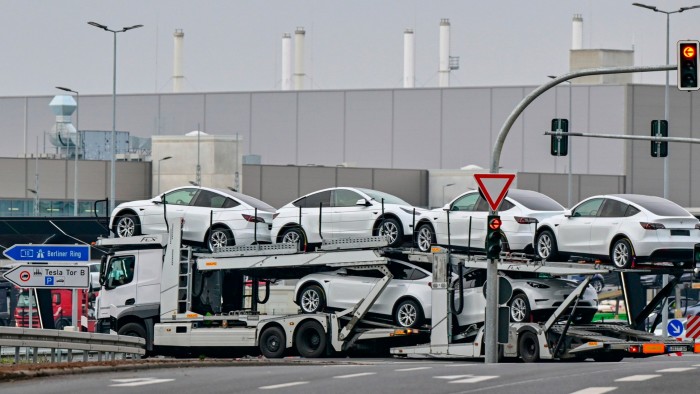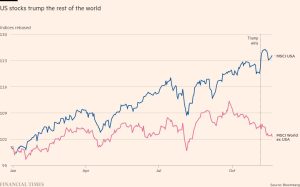Car transporters face big costs and fines from German safety standards

Stay informed with free updates
Simply sign up to the Automobiles myFT Digest — delivered directly to your inbox.
European car transporters face hundreds of thousands of euros in costs and potential fines after the introduction of German standards on how vehicles are lashed to trailers.
The rules are an example of the web of red tape faced by businesses in Europe and which are to blame for the bloc’s slowing economy and waning global competitiveness, critics say.
Car transport companies say they were only given one week’s notice of the new standards, which were introduced in September and require them to meet more stringent standards for the straps and wheel blocks that secure cars to their trucks, in order to travel on Germany’s roads.
The rules were set by the German engineering body VDI. But its standards are used across Europe because of Germany’s leading role in the car manufacturing supply chain and because the country is the main transit point for car transporters travelling from eastern Europe to western European ports and markets.
Technical experts at VDI have requested that Brussels make the rules a European standard. But their complexity has tapped into wider anxiety about a pile-up of red tape and compliance costs for those doing business in the EU.
In a report published in April, former Italian prime minister Enrico Letta blamed “gold-plating” of existing EU guidelines for the “fragmentation of the single market . . . increasing difficulties and multiplying obstacles to productive activity”.
Frank Schnelle, executive director of European vehicle logistics industry body ECG, said: “We do not understand why we need this extra guideline, which is an administrative burden and which costs money, when [the previous rules] worked for the past 30 years.”
Under the new VDI standard, cars must be secured to transporters with more straps and the wheel blocks and rails on which they sit must be strengthened. For the first time it also requires that trucks are certified as meeting the guidelines.
The VDI says the changes are necessary because of the increased weight of electric vehicles compared with conventional cars and the age of Europe’s transporter fleet, with many trailers approaching 20 years old.
But transporters say the concerns are unfounded. “We have been transporting Tesla [electric vehicles] for eight years or more,” Schnelle said.
A VDI spokesperson told the Financial Times the previous standard introduced in 2009 “no longer reflected the current state of the [technology], especially given innovations in the automotive market. While compliance with the new rules would require “adjustments”, it said, “they are necessary to maintain safety”.
The impact on transporters ranges from set-up costs to increased loading times that would eat into already tight deadlines for drivers, trucking companies said. Depending on the design of trailers, some may have to carry fewer cars, cutting into profits, Schnelle said.
Wolfgang Goebel, a board member at German logistics company Mosolf, estimated that the rule change could increase loading times by up to five minutes per car, adding about 40 minutes to every journey.
Goebel said the short notice meant the industry “had to do everything at one moment, which [involved] extra cost”.
The car transport sector was only just beginning to recover following a post-Covid slowdown in vehicle manufacturing as a result of semiconductor shortages, the ECG said. In response, many transporters have cut capacity and laid off drivers.
Rene Eisbrich, chief operations officer at Austrian transporter Lagermax Autologistik, said that upgrading his company’s fleet of 500 trucks would cost about €1mn. Another big challenge was the backlog of orders for new lashings that meant transporters were forced to risk fines by running non-compliant trucks.
“Technically we are not able to comply because the needed equipment is not on the market . . . We need 25 per cent more wheel blocks and 30 per cent more lashes per truck, and across the European fleet that means thousands of lashes and wheel blocks,” he said.
Two of his trucks had already been pulled over by police in Austria and faced penalties, he added.
Schnelle said the cost of certifying trailers more than 20 years old could stretch to about €30,000 for each.
Kurt Garrez, head of car securing for the Belgian federal police, said Belgian law required truck companies to comply with the VDI standard if car manufacturers requested it.
If they did not do so, drivers would face fines of up to €1,000 or be forced to pull over and put the cars on to an alternative truck.
It would be easier for the standard to be applied Europe-wide, he said. “The problem is it’s not always the same in Europe, but transport has to pass borders so it’s important for EU countries to have the same rules.”
#Car #transporters #face #big #costs #fines #German #safety #standards




